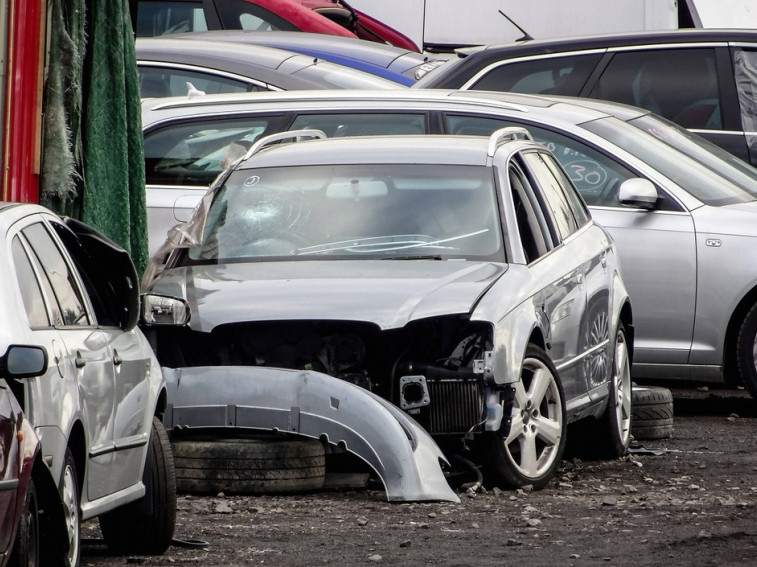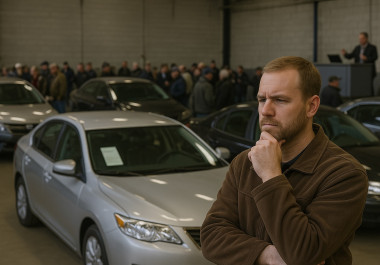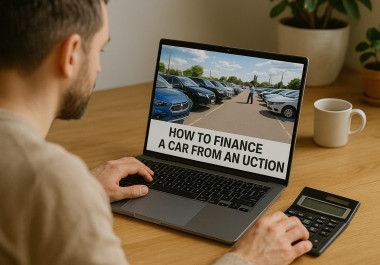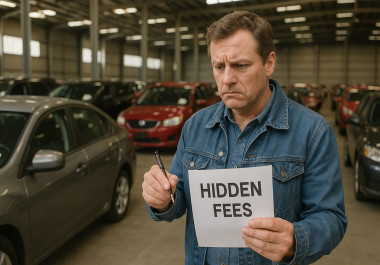Hosting salvage car auctions online is our raison d’être here at RAW2K, so it’s fair to say we know a thing or two about them! Our experts still regularly field plenty of questions from our customers - both business and private - and before you commit to buying an auction car yourself, it’s handy to familiarise yourself with some of the answers!
We’ve compiled the answers to some of your most common questions below, including various definitions and factors you’ll need to consider in advance. But let’s start right at the beginning…
What does it mean when a car is listed as salvage?
In case you’re asking ‘what is a salvage car?’ - essentially, it’s a vehicle which an insurance company no longer considers roadworthy. This can be for a variety of reasons; it might have been involved in an accident or collision, or subject to weather damage. Cars can also be classed as salvage if they’ve been stolen and subsequently recovered, as is the case with many Category U cars.
In short: if the insurance company judges that the cost of necessary repairs will exceed the car’s total value, they’ll declare it as written off. (This is where the US term ‘totaled’ comes from, by the way).
Once the car has been written off, it’ll be put into a salvage category, or given a salvage title - both of which are separate terms for the same process. There are four different salvage categories, which are designed to indicate a car’s rough level of damage. In descending order:
Category A
Scrap only. These types of car are judges too unsafe to ever be driven again. Even the removal of parts is prohibited; the entire car must be scrapped.
Category B
Some parts can be removed, but the body of the car must be scrapped.
Category S
Significant structural damage. Expensive to repair, but can be put back on the roads. (Before October 2017, these were known as Category C vehicles.)
Category N
Non-structural damage. Expensive to repair, but can be put back on the roads. (Before October 2017, these were known as Category D vehicles.)
Can I buy a salvage car?
Absolutely, it’s not difficult to purchase vehicles in salvage car auctions online. Unlike certain physical auction houses, you don’t need any special licences, and online auctions are open to both private customers and commercial dealers. As long as there are no legal restrictions (such as being underage), you’re free to buy what you choose!
Is it worth buying a salvage car?
To be honest, this is one of those famous ‘how long is a piece of string?’ questions. The conditions and values of salvage cars can differ greatly between vehicles, so it’s more sensible to ask - what is a salvage car worth to you?
Before you commit to buying a salvage car online, you need to ask yourself a lot of questions. For example, you need to decide well in advance what you intend to use the car for, what you’re willing to sacrifice and what you’re willing to spend.
Here’s the most important bit to remember; it’s all about the economics. Insurers go by cold hard numbers. The damage in question doesn’t have to be incredibly severe to write off the car - in fact, some cars can be pushed over their acceptable damage threshold by something as small as damaged wing-mirrors.
Individual car buyers, though, get the benefit of being able to use their personal judgement, and will usually have more flexible attitudes as to what they consider acceptable levels of damage. It’s just one reason why online salvage car auctions can be such a great source of bargains - it’s all in the eye of the beholder!
Having said that, there’s no doubt that price is the main draw for a lot of buyers. As long as you do your research well in advance and you know what you’re looking for, you can end up saving hundreds or even thousands on an auction car.
Is it worth repairing a salvage car?
Much like we’ve outlined above, the answer depends on the type and extent of the damage to the vehicle, and what you’re planning to use it for. Fire and flood damage are both notorious for being exceptionally difficult to repair, and both are quite capable of putting a car out of commission permanently.

However, if it’s merely classed as a Category S or N salvage car, these can be more lucrative. It also depends on if you’re personally doing the repairs. It takes no small amount of mechanical expertise to get a car roadworthy again, but if you’re skilled and efficient enough, you can make a tidy margin fixing them up and selling them on.
Do salvage cars still have warranty?
No. When a vehicle is involved in a severe accident or collision and it’s been given a salvage title or declared a total loss, then the warranty is automatically null and void. This makes sense when you think about it - it doesn’t make much financial sense for manufacturers otherwise!
If you’re buying privately, it’s wise to treat any claims of a continuing warranty with extreme suspicion. If you can, take a look at the warranty manual (or the owner’s manual by the warranty provider) so you can get the full details. We’ll tell you now, though; it’s unlikely to back up those claims.
Can you get insurance of a salvage car?
You can indeed insure a salvage car. In fact, if you intend to drive it again, you’re legally obligated to, as every car that’s being driven on the roads must have some form of insurance. You’ll likely find that you’re only able to secure relatively limited cover, though, compared to what you’d normally find for a brand-new vehicle.
Many insurers will only offer insurance on salvage cars for heftier premiums, since they might view damaged vehicles to be more of a safety risk. Others may judge the vehicle to have very little value, resulting in them paying out very little in claims.
That’s not to say that seeking insurance on a salvage vehicle is a pointless or futile task. You may even find the odd insurer who doesn’t take it into account at all. However, you should simply prepare to spend a bit more time hunting down for deals to get the best value.
Four things to bear in mind for online salvage car auctions
Set your budget early on
Even online auctions can carry their fair amount of pressure and intensity, which means that it can be easy to get carried away with the heat of the moment. Overenthusiasm can easily end up putting you over your budget, which can take the edge off any savings you’re making. Set your limits well in advance, and pay attention to when you’re nearing them!
Remember you can’t drive your new purchase away
By their very definition, salvage cars are not roadworthy. That means they’re not taxed and they’re not insured, so you’re not able to drive your new purchase immediately. Therefore, your budget will have to factor in the cost of their removal, and transport to your home or business premises.
Bear in mind the variations in salvage car quality
As we’ve covered above, salvage cars are subject to a high degree of variation. Therefore it’s important to know the various shorthands in advance (such as the different salvage titles) so you can avoid making any mistakes that might end up being extremely costly.
An inspection is never a bad idea
Buying a reliable car means that you’ll be making a purchase that’s well into the triple figures, and as a rule of thumb, whenever you’re spending that amount of money it’s always a good idea to inspect your purchase in person. Again, make sure you do your research and know what faults you’re looking for, and decide what you’d consider a dealbreaker.
Here at RAW2K, we are one of the nation’s leading sites for salvage car auctions online. You can find a massive range of vehicles amongst our stock, including models from BMW, Audi, Peugeot and Volkswagen. Why not take a look around our site, and see what you can find?




